The moves to cool off the overheated property sector by Malaysia in the last few years were wise (if a bit late). The 6% sales tax was also likely wise. Real estate development tends to get overheated and collapse – taking much wilder swings than other areas of the economy. Reducing those swings is useful but challenging. How the current situation plays out will be interesting and requires government paying attention and taking action to prevent bubbles and excessive speculation, as well as watching for signs the bubble is deflating too quickly.
Malaysia Builders Hit by Tax Amid Worst Slump Since 1998
Malaysian property companies are grappling with higher costs in an industry already reeling from central bank curbs on lending last year and the first interest-rate increase in more than three years in July. Property transactions in 2013 sank the most since the aftermath of the 1997 Asian financial crisis, while home prices in the first quarter rose at the slowest pace since 2010.
…
Property transactions dropped 11 percent in 2013, according to the National Property Information Centre, the most since a 32 percent slump in 1998, when Malaysia had its first recession in 13 years. The Malaysian House Price Index rose 8 percent in the first three months of 2014, the slowest growth since the third quarter of 2010.Developers offered 6,339 new units in the first quarter, a drop of almost 50 percent compared with the previous quarter. Only 30 percent of the units were sold.
It is possible the slowdown in real estate development will be too sharp which creates problems. But if that happens the main reason will be the bubble was allowed to build too quickly. And there is also the possibility the slowdown will not be quick enough (the bubble will keep growing); this seems less likely.
Luxury condos in Johor Bahru seem the most bubbly of all areas in Malaysia. It seems like Kuala Lumpor and Penang are also in danger of too must leverage and speculation. The moves to reduce that leverage, speculation and bubbly markets are good. We will see how the market develops the rest of this year and next year.
Related: Singapore Market Impacts on the Johor Bahru Real Estate Market – Singapore and Iskandar Malaysia – Penang’s Economic Gains – Iskandar Housing Real Estate Investment Considerations – Johor Bahru Restaurant Reviews – Singapore Taxes Increase In Attempt to Cool Condo Prices
